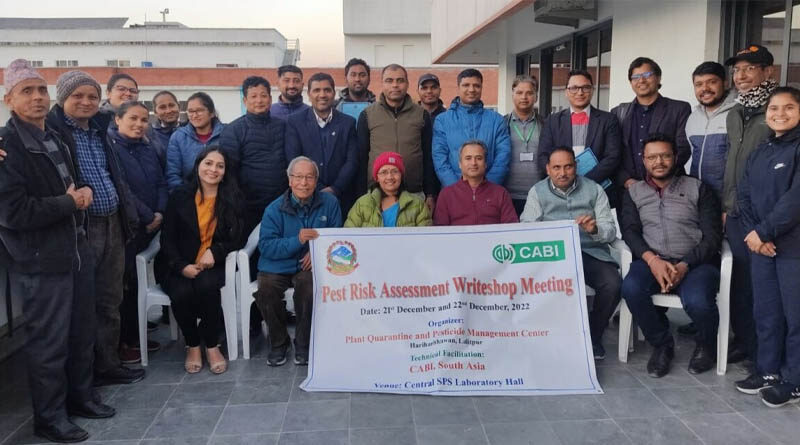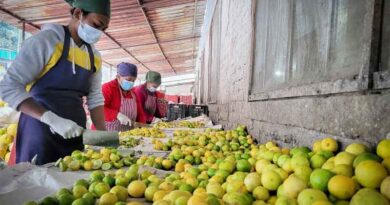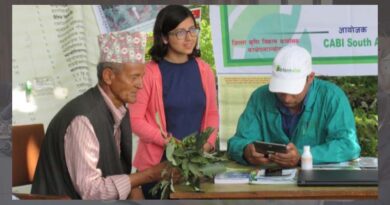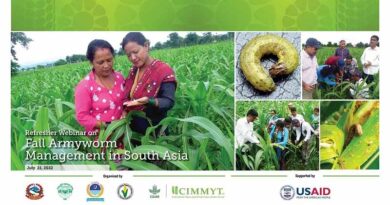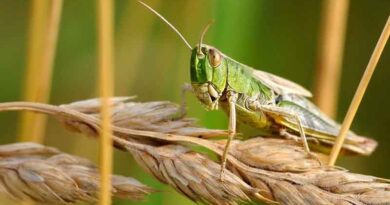CABI facilitates Pest Risk Assessment writeshop in Nepal
14 January 2023, Nepal: Last month, CABI delivered technical support in a two-day pest risk assessment writeshop for plant quarantine officers in Kathmandu, Nepal. The Plant Quarantine and Pesticide Management Centre (PQPMC) which serves as National Plant Protection Organization (NPPO) of Nepal organized the writeshop.
CABI facilitated the workshop as a part of their continued support for pest risk assessment and horizon scanning digital tools. These were launched in 2019 in the South Asian region.
The workshop was inaugurated by Mrs. Sabitri Baral, Chief Plant Quarantine and Pest Management Centre (PQPMC) Nepal. In her opening remarks, Mrs. Baral emphasized the importance of pest risk assessment for the country plus the need for awareness of the serious risks that pests, particularly invasive alien pests, pose to the agricultural sector.
Later, Mr. Prakash Paudel, Senior Plant Protection Officer (Under-secretary), PQPMC, Nepal addressed the participants. He reiterated the value of this work to the country and hence the importance of the event.
CABI’s Dr. Vinod Pandit, Programme Leader, Development, Communication and Extension, South Asia, also welcomed participants on behalf of CABI. Dr. Pandit outlined the importance of the pest risk assessment to trade and market access.
20 plant quarantine officers from across various regions of Nepal attended the workshop.
During the workshop, CABI expert, Dr. Manju Thakur, Regional Coordinator Asia, Knowledge Bank gave the participants an overview of the pest risk assessment process. In addition to the different stages of the pest risk assessment with examples.
Over the course of the two-day writeshop, she presented CABI’s pest risk assessment tools including: the Crop Protection Compendium (CPC), PRA decision support tool and the Horizon Scanning Tool (HST). All of these tools are designed and maintained with risk assessors in mind.
Plant quarantine officers at the writeshop gained hands-on experience of initiating the pest-initiated PRAs and a pathway-initiated PRA using the decision support tool. They got to go through the full process from initiation, to risk assessment and finally risk management for the species highlighted by the tool.
In the initiation stage of a pathway-initiated PRA, the tool generates a list of species that may need assessing for risk to the PRA area. From this list, risk assessors can begin to assess the probability of entry, establishment, and spread of particular species. As well as the potential impact of the species should it arrive and establish in the PRA area. Users can also identify and document risk management options for high risk species within the tool.
The tool not only provides a step-wise framework for completing a PRA but it also integrates other CABI knowledge management tools like the Crop Protection Compendium. This makes detailed pest datasheets readily available so users can complete accurate PRA reports. In addition, the integrated Horizon Scanning Tool generates the pest lists for potential threats. CABI and non-CABI open sources of information were showcased to the participants were also shown both in order to ensure completion of PRAs.
Participants were very excited and engaged actively in the workshop. They discussed practical problems and their solutions. Some participants also shared that they were not using any proper method for doing PRAs. But this training had instilled confidence in them to do complete PRAs on their own. At the end of the workshop, participants drew up a plan: to use the PRA tool for completing a few pest-initiated PRAs of priority pests.
CABI launched the PRA tool in 2019, after rigorous testing with risk assessors from different countries. The tool makes the job of conducting PRAs easier and more efficient. It guides users through the steps required in completing a PRA and making relevant information easy to access.
The workflow of the tool is closely aligned with the International Plant Protection Convention’s (IPPC) International Standards on Phytosanitary Measures (ISPMs). In particular, ISPM 2 and ISPM 11. Both of which outline the process for completing a PRA.
84 countries across the globe have now accessed CABI’s PRA tool. Gratis access has been provided to many middle- and low-income countries.
Also Read: Garuda Aerospace signs MoU with Rallis India
(For Latest Agriculture News & Updates, follow Krishak Jagat on Google News)

